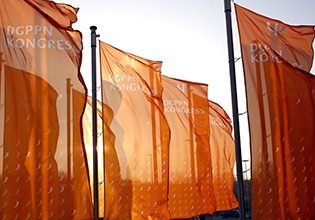Symposien
Catatonia: an under-researched and forgotten – but frequent – neuropsychiatric phenotype

Symposium of the National Academy of Sciences Leopoldina at the DGPPN Congress 2018
| Date: | Thursday, 29 November 2018 |
| Time: | 10:15 to 11:45 |
| Location: | CityCube Berlin, Saal A8, Messedamm 26, 14055 Berlin |
Catatonia is among the most mysterious and as yet poorly understood neuropsychiatric syndromes. Nevertheless, it is an under-researched and virtually forgotten – but still frequent – neuropsychiatric phenotype. Appearing as a ‘psychomotor syndrome’, it reflects temporary disruption of executive control in the absence of any ‘classical’ motor dysfunction. Catatonia is typically characterized by a fluctuating course with episodic exacerbations and has historically been associated with schizophrenia where it is classified as a positive symptom. Catatonia is, however, also observed in mood and substance-induced psychotic disorders, malignant neuroleptic syndrome, most encephalitides, and even general medical conditions.
The proposed symposium is devoted to catatonia, reminds of its historical roots and its position in the current classification systems, refreshes the underpinnings of a catatonia/catatonic sign diagnosis, and highlights recent developments in catatonia research.
Stephan Heckers, an expert in medical history and classification of catatonia will illuminate on this mysterious ‘across-disease’ syndrome and its various symptoms. As a pioneer in catatonia imaging, Georg Northoff will provide functional magnetic resonance data on patients and, based hereon, will give putative hints of neuronal mechanisms at work in human catatonia. Peter Falkai will focus on the significance of catatonia, a variable psychomotor syndrome of executive control deficiency, in clinical reality today: from under-diagnosed to forgotten. Finally, Hannelore Ehrenreich will demonstrate that catatonia can be modeled in specific myelin mutant mice, all characterized by mild neuroinflammation, and that it can be treated by microglia-targeted pharmacological intervention.
DGPPN Congress 2018
From anxiety disorders to obsessive-compulsive disorder: The top-class scientific and further education programme of the DGPPN Congress 2018 offers a comprehensive overview of current and future developments in the field of mental health – with practical insights for prevention, diagnosis and treatment. 15 percent of the programme will be held in English. The German Association for Psychiatry, Psychotherapy and Psychosomatics (DGPPN) is the largest scientific medical association focussing on mental health in Germany. It pools the competence of 9000 doctors and scientists in the fields of psychiatry, psychotherapy and psychosomatics who work in university and non-university hospitals, in office-based practices and in research.
Picture: Holger Schwarz
Weitere Informationen
Es handelt sich um eine geschlossene Veranstaltung für Fachpublikum. Eine Anmeldung ist erforderlich (Kongressanmeldung).
Kontakt
Slava Platikanova
DGPPN e. V.
Tel.: (030) 2404772-13
E-Mail: s.platikanova@dgppn.de
